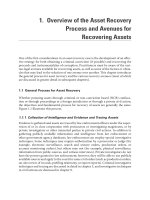Sample role plays from ESL role plays
Bạn đang xem bản rút gọn của tài liệu. Xem và tải ngay bản đầy đủ của tài liệu tại đây (326.9 KB, 9 trang )
Description - Chefs argue for why they should keep their job.
Preparation - Copy / cut role play cards before class. Prepare one role play card per student.
Divide the class into groups of four. A group of
three can be made if necessary. Ask groups to
brainstorm some reasons why a chef might get
fired. Go over their ideas as a class. Then, ask
them to brainstorm what qualities a good chef
has and elicit some examples.
Note - The discussion questions are about cooking
in general, not just about chefs. Depending on the
teacher’s preference, the discussion questions can
be used during the warm up, wrap up, or as a
supplement if the activity runs short.
Tell groups the restaurant they work for is
losing business because of complaints, and they
can only keep one chef. The manager must
choose which chef to keep.
Hand each student in the group a role play card
and give them time to read it. Explain any
unfamiliar vocabulary from the cards.
Give the manager role card to a more outgoing
student if possible. If you have a group of three
you can leave out a chef role card. Tell the
students not to show their cards to the group.
Tell the managers to identify themselves but not
show their card.
Give managers time to think of questions to ask
and the chef’s time to plan how they will keep
their job.
Groups should arrange their desks or chairs so
that the chefs’ desks are facing the manager like
an interview. Explain that at the end of the role
play the manager will make the decision of who
to keep. Chefs should do anything they can to
keep their job.
Students can stay seated. All groups in the class
will do the role play at the same time while the
teacher monitors and makes notes of common
errors. Try not to interrupt or interfere with
the role play unless absolutely necessary.
Give students around ten minutes to complete
the role play. The role play may run short or
long depending on how outgoing and confident
your students are. When one or two groups
look like they are finished, tell the other groups
they have one minute to finish up.
For each group, ask the manager who they
decided to keep and why.
Would you like to be a chef? Why?
How hard is it to become a chef? What do you have to do to become a chef?
How often do you cook?
If you had your own personal chef, what meal would you ask for most often?
How good are you at cooking? What are some things that you can cook?
What dish or food are you best at cooking?
Do you think you can cook better than your mother?
Who is a better cook, your mother or your grandmother?
Are cooking shows popular in your country? Do you watch any cooking
shows?
What are some of the advantages of cooking your meals at home? How about
the disadvantages?
Is it important for husbands to know how to cook?
Does your father cook?
Who is the best cook you know?
Role 1
The manager
You are a manager of a restaurant. The owner of the restaurant has told you that
you can only keep one chef. Your goal is to choose the best chef to keep.
There has been a lot of complaints from customers and bad online reviews. This has caused
business to decline at the restaurant so now you can only keep one chef. The complaints are
because of the chefs doing a bad job, but you are sure at least one of the chefs is really good.
The owner is furious, and you think you will lose your job if you don’t pick the right chef to
keep. You can’t fire all the chefs because then the restaurant will close.
Role 2
Chef one
You are a chef at a restaurant. Your goal is to keep your job.
The chefs you work with are amateurs. They are always making mistakes. You believe that if
you can get rid of the other chefs you can make this restaurant amazing. If you are put in
charge of the kitchen, you can turn this restaurant into the most popular restaurant in the city.
You’ll become a famous chef like you have dreamed of since you were a child.
Role 3
Chef two
You are a chef at a restaurant. Your goal is to keep your job.
You’ve been working really hard, but it’s difficult to concentrate because you are a single
parent with three kids. You’ve got a lot of stress and lots to worry about. Sometimes you
make mistakes because you are too tired and stressed out. You need this job though. Your
kids are depending on you. You’ll do anything to keep this job. You don’t know what your
family will do if you lose this job.
Role 4
Chef three
You are a chef at a restaurant. Your goal is to keep your job.
You hate this restaurant, and you really hate the owner. When this restaurant opened it
caused your family’s restaurant to close. Your grandfather started that restaurant 50 years ago.
You trained as a chef to work in your family’s restaurant, but when you graduated from
culinary school it closed because of this restaurant. You got a job here so you could destroy
the restaurant from the inside. It’s almost closed, but you have to lie to keep your job so you
can finish destroying this restaurant.
Description - Hotel guests try to get their money back.
Preparation - Copy / cut role play cards before class. Prepare one role play card per hotel owner and
one role play card per pair of guests.
Divide students into groups of three. A group
of two can be made if necessary. Ask groups to
talk about their most memorable hotel stay. It
can be a bad memory or a good memory. Elicit
some stories. Then, ask students to brainstorm
some things that make a hotel stay good or bad.
Make two columns on the board and have them
list their ideas.
Note - The discussion questions are about hotels /
hostels in general. Depending on the teacher’s
preference, the discussion questions can be used
during the warm up, wrap up, or as a supplement if
the activity runs short.
Tell students that two friends stayed in a small
family run hotel. The next morning the two
friends go to the front desk.
Hand the most outgoing student a hotel owner
card. Tell the other two they are friends and
hand them the hotel guests’ card.
Explain any unfamiliar vocabulary from the
cards, i.e., refund, horrible, etc. Give students
time to think of arguments for their role.
Tell students they must find a way to resolve
the conflict so that everyone is happy.
Students should arrange the desks so the hotel
owner is standing behind two desks put
together like a counter and the friends are in
front of the hotel owner.
All groups in the class will do the role play at
the same time while the teacher monitors and
makes notes of common errors. Try not to
interrupt or interfere with the role play unless
absolutely necessary.
Give students around six minutes to complete
the role play. The role play may run short or
long depending on how outgoing and confident
your students are.
When one or two groups have come to a
compromise, let the other groups know they
have two minutes to finish up.
Elicit from each hotel owner what they decided
to do to keep everyone happy and if they had
to refund any money.
Which do you prefer to stay in when you travel, hotels, hostels, or another
type of place? Why?
What are the best and worst things about staying in hotels?
Have you ever been to a really disgusting hotel? Did you stay or leave?
What do you think about people letting travelers stay at their homes instead
of at hotels?
Do you feel comfortable when you are staying at a hotel?
Have you ever ordered room service?
Do you have any interesting stories about staying somewhere other than your
house, like a hotel or hostel?
Are hotels common in your country? If not, where do people stay when they
travel?
What is the nicest hotel you have stayed at?
What would it be like to work in a hotel as a cleaning person or front desk
staff?
Have you ever eaten anything out of the minibar (the refrigerator with snacks
and drinks)? Was it expensive?
Role 1
Hotel owner
You are the owner of a small hotel and two guests are coming to complain about
their room.
You have two guests that are coming to complain about their room. They stayed the whole
night and didn’t tell anyone about the problems they were having. If they had let you know,
you could have moved them into another room, but they stayed the whole night, so you don’t
want to give them a refund. You think they are just trying to avoid paying for the room. Try to
make them happy so they won’t give you a bad review but try to avoid giving them a refund.
Role 2
Hotel guests
You and your friend are very unhappy with your hotel room, and you want your
money back.
The room at the hotel was not worth the money you paid. The room had an awful smell. The
beds were uncomfortable. The water in the shower was only warm and never got hot enough.
The people in the room next to yours were really loud. The TV only had three channels. The
air conditioner wasn’t cold enough and neither was the refrigerator. It was a horrible night and
a horrible room. You and your friend want your money back.
Description - Students compete to win a prize for the best website idea.
Preparation - Make a copy of the “Website Idea Sheet” for each pair (optional).
Put students into pairs. If there is an odd
number, make a group of three. Ask pairs to
brainstorm websites they use every day or
every week. Elicit some ideas from the pairs.
Now, ask them to discuss why those sites are
so popular.
Note - The discussion questions are about the
Internet in general rather than specifically about
websites. Depending on the teacher’s preference,
the discussion questions can be used during the
warm up, wrap up, or as a supplement if the
activity runs short.
Tell pairs they will come up with a new website
idea together. Tell them they will compete for a
prize of $100,000 from a company that will
make the website a reality. Second place will get
$10,000.
Give each pair a copy of the “Website Idea
Sheet”, if you are using it. Give students time to
come up with a website idea and fill in the
sheet.
When most of the pairs look like they are
finished, split each pair. One student will be a
judge for the competition, and one will be a
contestant.
Have the students set up the desks with two
desks facing each other. Have all the judges sit
facing the same way so they are facing their
partner, who will be the contestant. Tell judges
they are judging sites based on originality,
possibility for popularity, and usefulness /
entertainment.
Contestants rotate clockwise so they are facing
a judge who is not their partner.
1st Round
Contestants will have two minutes to pitch
their website idea to the judges. After two
minutes, tell contestants to rotate clockwise to
the judge next to them and pitch their idea
again for two minutes. Repeat this for four
turns or until students get back to their partner.
Have the contestants stand up at the front of
the class and ask the judges which contestant
they will choose. Congratulate the two
contestants with the most votes.
2nd Round
After the 1st round, pairs discuss with their
original partner what the contestants learned
about pitching their website idea. Contestants
and investors then switch roles. Repeat the
instructions for the 1st round going counter
clockwise this time.
After the role play is finished, ask the winners
of each round to present details about their
website idea.
How much time do you spend on the Internet?
What are some of the benefits of the Internet?
What are some of the dangers of the Internet?
How much time should children spend on the Internet?
How has the Internet changed the world?
What will the Internet be like in ten years?
Are you part of any social networks like Facebook or Google+?
When did you get your first email address?
What is your favorite website?
Tell your partner / group about one website you really like.
Should the Internet be regulated or censored?
Website Idea
Have an idea for website? You could win $100,000!
You are going to create a new website idea and try to win $100,000.
Your website idea should be unique and original. There shouldn’t be any other websites like it.
It should be entertaining and / or useful. It should also have the possibility of becoming
incredibly popular.
__________________________________________________________________
__________________________________________________________________
__________________________________________________________________
__________________________________________________________________
__________________________________________________________________
__________________________________________________________________
__________________________________________________________________
__________________________________________________________________
__________________________________________________________________
__________________________________________________________________
__________________________________________________________________
__________________________________________________________________









